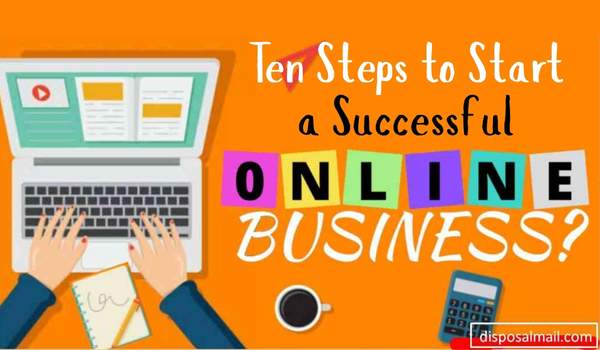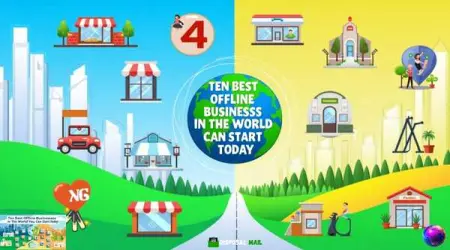Ten Steps to Start a Successful Online Business

Starting an online business has become more accessible than ever, with the potential for global reach and scalability. With e-commerce on the rise and digital products booming, entrepreneurs can capitalize on various opportunities. In this guide, we'll explore the critical steps involved in launching and growing a successful online business, from identifying a niche to scaling your operations.
Ten Steps to Start a Successful Online Business
Starting a successful online business requires careful planning, determination, and a strategic approach. Here's a breakdown of what it takes to get started:
1. Identify a Profitable Niche
Research Market Demand: Choose a niche with a clear demand that isn't overly saturated. Use tools like Google Trends, keyword research tools, and competitor analysis to gauge interest.
Target Audience: Understand who your ideal customers are, their pain points, and what solutions they’re seeking.
2. Create a Business Plan
Define Your Business Model: Decide whether you sell products, services, or digital goods. Consider dropshipping, affiliate marketing, or creating a subscription-based service.
Set Clear Goals: Outline your business objectives, financial goals, and key milestones to track your progress.
3. Develop Your Brand
Brand Identity: Create a unique brand name, logo, and color scheme that resonates with your target audience.
Build a Story: Develop a brand story that connects emotionally with your audience, making your business relatable and memorable.
4. Build a Professional Website
Choose the Right Platform: Depending on your technical skills, choose between platforms like Shopify, WordPress, or Wix. Make sure your website is mobile-friendly and easy to navigate.
Focus on User Experience (UX): Ensure your website loads quickly, is easy to navigate, and provides a seamless user experience.
5. Create High-Quality Content
Content Strategy: Develop a content plan that includes blog posts, videos, and social media updates that educate, entertain, and engage your audience.
SEO Optimization: Optimize your content for search engines to improve visibility. Use relevant keywords, meta tags, and high-quality images.
6. Set Up E-commerce Functionality
Product Listings: Create detailed product descriptions, high-quality images, and customer reviews to build trust.
Payment Gateway: Integrate secure and convenient payment options, such as PayPal, Stripe, or credit card processing, to facilitate transactions.
7. Implement a Marketing Strategy
Social Media Marketing: Use platforms like Instagram, Facebook, and LinkedIn to promote your products and engage with potential customers.
Email Marketing: Build an email list and send regular newsletters with valuable content, promotions, and updates.
Paid Advertising: Invest in targeted ads on Google, Facebook, or other platforms to reach a larger audience quickly.
8. Build a Customer Support System
Live Chat & Email Support: Offer multiple channels for customers to reach you, including live chat, email, and social media.
Disposable Emails for Social Media (Facebook, etc.)
FAQs and Knowledge Base: Provide a detailed FAQ section or knowledge base to help customers find answers to common questions.
9. Analyze and Optimize
Track Performance: Use analytics tools like Google Analytics to monitor traffic, sales, and customer behavior on your website.
A/B Testing: Regularly test different aspects of your website and marketing campaigns to see what works best.
10. Scale Your Business
Automate Processes: Implement tools and software to automate tasks like email marketing, inventory management, and customer support.
Expand Product Lines: As your business grows, consider adding new products or services that complement your existing offerings.
Outsource: Hire freelancers or staff to handle tasks like customer service, content creation, and marketing so you can focus on strategic growth.
How to Sell on Envato ThemeForest to Grow Your Business
Summary
Starting a successful online business takes more than just a good idea. It requires careful planning, consistent effort, and the ability to adapt and grow. By following these steps, you can build a strong foundation for your online business and increase your chances of long-term success.
Challenges of Running an Online Business
Common Hurdles and How to Overcome Them
Challenges like cash flow issues, supply chain disruptions, or website downtime can derail a business if not addressed early.
Managing Competition
Differentiation is key. Focus on unique selling points (USPs) to stand out from competitors.
Coping with Market Fluctuations
Diversifying income streams and products can help mitigate the effects of economic downturns or market changes.
Free Make Money Online Micro Job & Best Freelancing Site
Future of Online Business
Trends in E-commerce and Online Business
Technologies like AI, AR, and blockchain are revolutionizing the online business landscape. Stay ahead by adapting to these emerging trends.
Adapting to Emerging Technologies
Automation, chatbots, and personalized shopping experiences are just a few examples of how businesses can enhance customer interaction.







